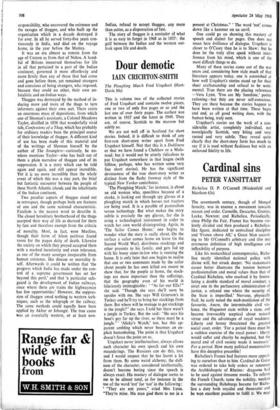Scourge of the thugs
J. ENOCH POWELL
As I write, I see on the shelf in front of me a dumpy book, with covers sun-bleached, worn and gnawed by cockroaches. It is William Sleeman's Rambles and Recollections of an Indian Official, a discursive journal which he wrote, for his sister's amusement, of a tour he made in 1835-36 from the Central Provinces to the Himalayas while on sick leave from his post. That post was not only the normal ad- ministration of a district. It was the central charge of the campaign against thuggee.
Of the small library of books on India which I accumulated while serving there in 1943-46, no other made so deep an impression on my mind. It is the authentic voice of the British in India from the far-off years before the Mutiny and before self-conscious Empire.
In the 1830s the government of the East India Company suppressed widow-burning and extirpated the secret societies of itinerant stranglers, or thugs, which for at least five centuries had destroyed thousands of travellers every year in the name of the goddess Kali. It was Sleeman, then a young army officer —he transferred to the civil service in order to get closer to the people of India—who first prohibited suttee in his district upon his own responsibility, who uncovered the existence and the ravages of thuggee, and who built up the organisation which in a decade destroyed it for ever. In all he served forty-five years con- tinuously in India, and died on the voyage home, in the year before the Mutiny.
It was an era almost as remote from the age of Curzon as from that of Nehru. A hand- ful of Britons immersed themselves for life in all that pertained to a part of the Indian continent, governed it more effortlessly and more firmly than any of those that had come and gone before them, yet remained strangers and conscious of being strangers, who imposed, because they could no other, their own un- fatalistic and un-Indian ways.
Thuggee was destroyed by the method of in- ducing more and more of the thugs to turn informers against their own sect. There exists an enormous mass of depositions, from which one of Sleeman's assistants, a Colonel Meadows Taylor, distilled in 1838 that wonderfully vivid tale, Confessions of a Thug, which has probably for ordinary readers been the principal source of their knowledge of thuggee. A different kind of use has been made of this material and of the writings of Sleeman himself by the author of The Stranglers—curiously, he no- where mentions Taylor—who has built out of them a plain narrative of thuggee and of its suppression. It is a story which can be told again and again, and still appear incredible. Yet it is no more incredible than the whole event of which this was a tiny part, the brief but fantastic encounter between the people of these North Atlantic islands and the inhabitants of the Indian continent.
Two peculiar aspects of thuggee stand out in retrospect, though perhaps both are features of one and the same national characteristic. Fatalism is the nearest word to describe it. The closed hereditary brotherhood of the thugs accepted their way of life as decreed for them by fate and therefore exempt from the criteria of morality. Most, in fact, were Muslims, though their form of Islam perforce found room for the pagan deity of death. Likewise the society on which they preyed accepted them with a marked incuriosity and even tolerance, as one of the many scourges inseparable from human existence, like disease or mortality it- self. Afterwards it could be written that `the progress which India has made under the con- trol of a supreme government has set her beyond this peril,' and that `a particular safe- guard is the development of Indian railways, since where there are trains the highwayman has few opportunities.' However, the suppres- sion of thuggee owed nothing to western tech- niques, such as the telegraph or the railway. The same methods could equally have been applied by Akbar or Jehangir. The true cause was an essentially western, or at least non- Indian, refusal to accept thuggee, any more than suttee, as a dispensation of fate.
The story of thuggee is a reminder of what it is as easy to forget in 1968 as in 1857: the gulf between the Indian and the western out- look upon life and death.







































 Previous page
Previous page